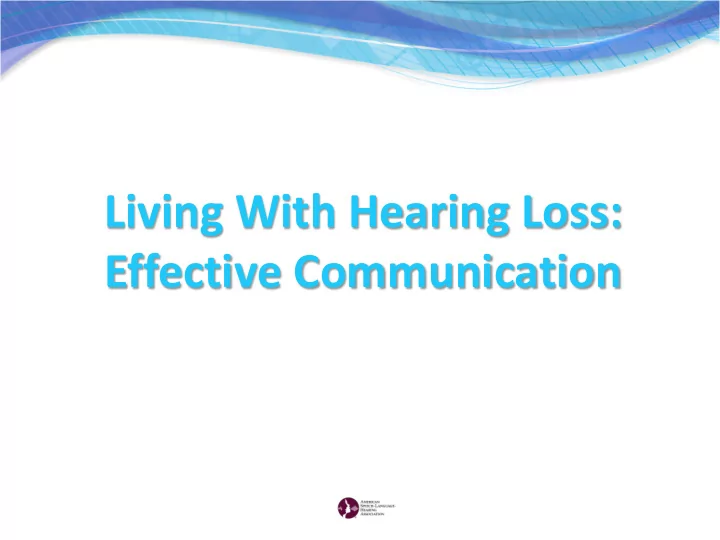

Living With Hearing Loss: Effective Communication
What conversational style are you? Passive Aggressive Assertive
"When someone in the family has a hearing loss, the entire family has a hearing problem.“ Mark Ross, PhD www.cartoonstock.com
Communication Strategies Use Clear Speech 1. Anticipatory Strategies 2. Repair Strategies 3. Dealing with the expectations of others 4.
Clear Speech Speaker precisely and accurately expresses every word and sentence Improve understanding Key phrases that add to clear speech techniques “I think” “Now I want to talk about something else” “What can I do to help you understand?”
Anticipatory Strategies Be aware of current events. Obtain meeting agendas in advance. Read reviews or synopses of plays or movies before attending. Ask what the topic of conversation is. Review names of party guests before arriving.
Conversational Repair Strategies Conversational Strategy Example Request for repetition Please repeat what you said. Neutral query What? Huh? Request for rephrasing Please tell me in a different way…. Request for confirmation The T.V. in the living room is broken? Request for specification Which T.V. is broken? Specific constituent repetition The T.V. in the living room is what? Conversational devices Okay, Yes, Uh-huh
Additional Repair Strategies Change/ modify environment. Ask the speaker to get your attention. Ask the speaker to face you when speaking. Ask for the topic or key word. Ask to spell out a word. Ask the speaker to use gestures. Ask to write it down.
Dealing With Expectations Share examples. Suggest ways that speakers can assist you. Share strategies that work best. Reassure.
www.deafhh.net/wp/wp-content/uploads/2009/05/icanthearyou.jpg
We’re here to help. For more information contact: American Speech-Language Hearing Association 2200 Research Boulevard Rockville, MD 20850 E-mail: audiology@asha.org Website: www.asha.org
Living with Hearing Loss: Effective Communication Presentation Notes Slide 1 No commentary Slide 2 Passive – Most people with hearing loss exhibit this communication style. Passive Communicators tend to avoiding social interactions or withdraw from conversations due to fear of not be able to communicate well or from embarrassment of not understanding. When they do participate, they may pretend that they understand by limiting their responses to a nod. They perceive it as “easier” to be passive. Aggressive – Aggressive Communicators dominate conversations in order to avoid having to work to understand their communication partner. They perceive any communication difficulties as being the speaker’s fault. A person with an aggressive communication style may ignore a speaker in order to force him/her to repeat. Because they trample on the needs of others, aggressive communicators are often perceived as hostile or overbearing. Assertive – Assertive Communicators are not afraid to disclose their hearing loss or to be open and honest about their communication needs when necessary. They are not afraid to use communication strategies or to advocate for themselves. Assertive communicators get their needs met. Slide 3 No commentary Slide 4 These strategies are for family members. Slide 5 No commentary Slide 6 Before entering a communication situation, think about who will be there and what might be said. Once you have anticipated possible vocabulary, dialogue, and names for a particular situation, practice speech ‐ reading those words with your spouse or conversation partner. Slide 7 No commentary Slide 8
No commentary Slide 9 No commentary Slide 10 No commentary Slide 11 No commentary
Recommend
More recommend